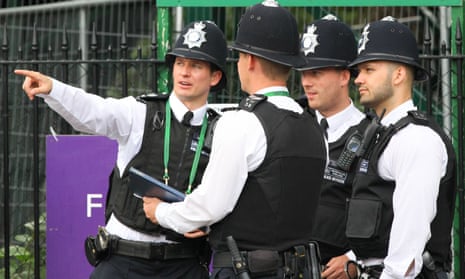Police capacity for gathering vital intelligence on potential extremists has been jeopardised by cuts to neighbourhood policing teams, former officers have claimed.
Since the London and Manchester attacks, questions have been raised about the police’s ability to monitor threats posed by those at risk of radicalisation. Robert Quick, Britain’s former counter-terrorism chief, said government cuts to police funding had damaged attempts to prevent attacks.
“Counter-terrorism funding is ringfenced, but cuts to the general policing budget has impacted on neighbourhood policing teams in many parts of the country, including London,” he said. “This has reduced the capacity of the police to work in communities building relationships and trust to in turn generate community-based intelligence about persons of concern.”
Now a number of former senior Metropolitan police officers have painted a stark picture of how the cuts have left their mark on the capital’s Safer Neighbourhood Teams, the force’s “eyes and ears” on the ground.
The officers, who requested anonymity, claim the teams have been key to detecting signs of radicalisation and gang-related activity in the past. Any information on extremism is passed to the borough counter-terrorism liaison officer, who in turn works with the counter-terrorism team. But their numbers have shrunk dramatically over the past decade, according to the officers in briefings submitted to Plaid Cymru’s home affairs spokeswoman, Liz Saville Roberts. The officers explained that in 2007 every ward in every London borough boasted a team comprising a sergeant, two police constables and three community support officers. But now there are just three officers in each team, with each unit covering three or four wards.
“The officers estimated that the cuts to the safer neighbourhood teams and other areas of borough policing had reduced their ability to gather data and intelligence from the local population by as much as 75%,” said Harry Fletcher, an adviser to Plaid Cymru.
Fletcher said that in 2007 the police officers in the teams had applied for those positions and had gone through a selection process. But now many had been assigned, suggesting that few wanted to work in the field. A commitment to ringfencing the teams’ budgets has also been lifted.
It is estimated that there are about 20,000 people with extremist sympathies in the UK. There are up to 500 plots at any one time, with 3,000 people under investigation.
Vera Baird, the police and crime commissioner for Northumbria and chair of the Association of Police and Crime Commissioners, said she was in no doubt as to how important the neighbourhood teams were in the eyes of the public.
“They are what everybody wants. The public wants to know a PC by name and to have them walking around their neighbourhood. They are incredibly important. Here in Northumbria we have set out our stall not to cut neighbourhood policing, but it is constantly under pressure.”
Plaid has drawn up a bill that would establish an independent body to monitor whether each police force was receiving adequate funding in the face of mounting demand for its services. The party is also tabling a series of parliamentary questions that it is expected will confirm there has been a serious depletion in the capacity of many forces’ safer neighbourhood teams.
“Police forces have been subjected to sustained cuts to their budgets which have undoubtedly detracted from their capacity to support the work of the security services,” said Saville Roberts. “Urgent changes are necessary – keeping the public safe must be the government’s top priority.”
A Home Office spokesman said: “In light of the recent appalling terrorist attacks we are engaging with the police about the demands they are currently facing to ensure they continue to have the resources they need to keep us safe.”

Comments (…)
Sign in or create your Guardian account to join the discussion